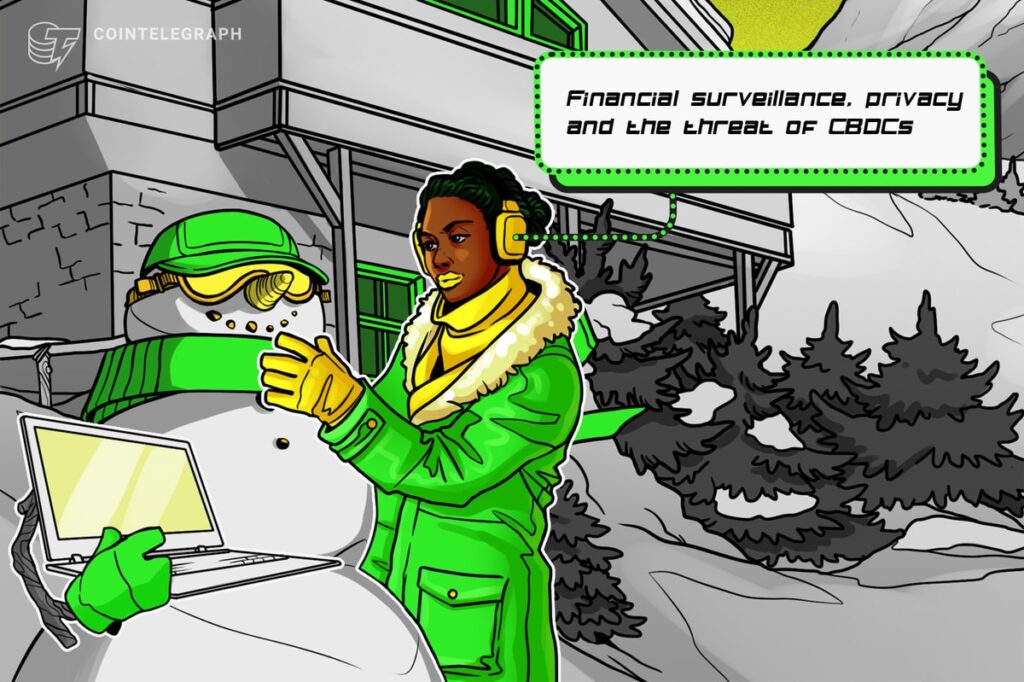When most people think of surveillance, they probably think of cameras on street corners, government agencies collecting emails, or smartphones and smart home devices listening to conversations. But there is another form of government and corporate surveillance that gets less attention but is just as prevalent: financial surveillance.
On Episode 12 of The Agenda podcast, Jonathan DeYoung is joined by Marta Belcher, a cryptocurrency and civil liberties attorney who serves as president and chair of the Filecoin Foundation and general counsel and head of policy at Protocol Labs, which helps develop the Filecoin protocol. The two discuss a wide range of topics, from the ins and outs of financial surveillance in the United States to why governments are turning away from cash in favor of central bank digital currencies (CBDCs).
What is financial surveillance, and why does it matter?
To understand how financial surveillance is carried out in the United States, one must first understand the U.S. Constitution. “The Fourth Amendment basically says, if you want to get information about a person in the United States, you as law enforcement have to have a warrant that has to be signed by a judge based on you having probable cause of suspecting them of a crime,” Belcher explained.
However, under what is known as the “third-party doctrine,” the U.S. government holds that any information voluntarily handed over to a “third party” — such as a bank — can be collected without a warrant or probable cause. Given the amount of customer information banks are required to collect under the Bank Secrecy Act, the government winds up with a significant amount of information on the financial lives of everyday citizens.
Related: Who watches the watchers? CryptoHarlem founder Matt Mitchell explains why surveillance is the enemy
“When you think about today’s world, we live our entire lives through third parties. At any given moment in time, we are sending massive amounts of data to all sorts of third parties,” said Belcher.
“The government can get basically any information about us, and it’s rendered the Fourth Amendment useless.”
However, not everyone cares that such vast amounts of information are collected about them — but should they? “As an advocate for privacy and civil liberties, I encounter this common refrain of, ‘Okay, but why should I care?’” Belcher explained. “I have nothing to hide, and I don’t care if the government sees my financial transactions.”
According to the civil liberties attorney, this is a limited perspective:
“You may think you have nothing to hide right now, but at any point in time, the law could be different. At any point in time, an administration can change. And I think that it is important, and people are starting to understand why it’s important, to be able to make transactions that the government can’t see.”
CBDCs: A cause for concern?
CBDCs are controversial, with some arguing countries must digitize their currencies to remain competitive — while others condemn governments having greater control over everyday people’s finances. Belcher believes that a significant reason governments worldwide are developing CBDCs is to make financial surveillance easier, and that these programs are part of broader initiatives to phase out cash and other untraceable transactions.
“A cashless society is really a surveillance society. And what we’re seeing worldwide is this push to make transactions surveilable. And that includes things like pushing central bank digital currencies.”
According to Belcher, the potential ramifications of adopting CBDCs go well beyond expanded surveillance: “They’re also about control.” She explained that governments could theoretically not only create but revoke money, alongside controlling how and where individuals spend their funds.
A CBDC is a perversion of cryptocurrency, or at least the founding principles and protocols of it—a cryptofascist currency, expressly designed to deny you the basic ownership of your money by installing the State at the center of every transaction. https://t.co/720SYvqzZM
— Edward Snowden (@Snowden) October 9, 2021
“For me, that is terrifying, right?” Belcher said. “For the government to not only have visibility potentially into all of your financial transactions and to really shut down other potential avenues for those types of transactions, but for the government to also be able to revoke money is really terrifying.”
To hear more from Belcher’s conversation with The Agenda — including her experience interviewing Edward Snowden, the benefits of privacy coins and what people can do to challenge surveillance — listen to the full episode on Cointelegraph’s Podcasts page, Apple Podcasts or Spotify. And don’t forget to check out Cointelegraph’s full lineup of other shows!
Magazine: Asia Express: Ripple, Visa join HK CBDC pilot, Huobi accusations, GameFi token up 300%
This article is for general information purposes and is not intended to be and should not be taken as legal or investment advice. The views, thoughts, and opinions expressed here are the author’s alone and do not necessarily reflect or represent the views and opinions of Cointelegraph.
Read the full article here







